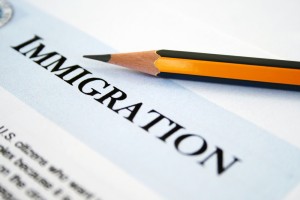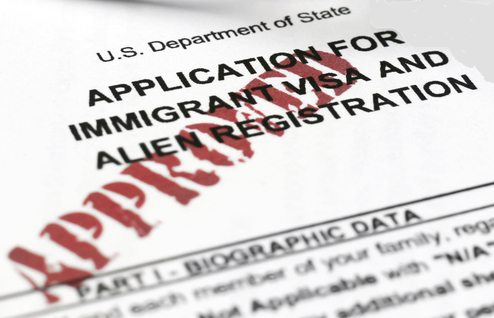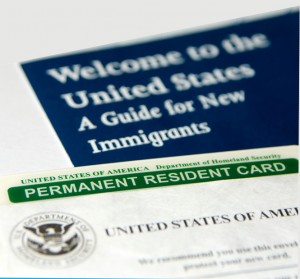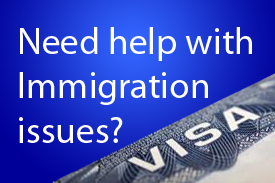Immigration
NEW …. Learn about H-1B Visas
and …. DAPA: Deferred Action for Parents of Americans and Lawful Permanent Residents
 When we think about immigration, most images that come to mind are those of the waves of immigrants coming to the United States in the late 1800’s to early 1900’s. Where shiploads of immigrants came to a place called Ellis Island, New York to start anew in a land of opportunity.
When we think about immigration, most images that come to mind are those of the waves of immigrants coming to the United States in the late 1800’s to early 1900’s. Where shiploads of immigrants came to a place called Ellis Island, New York to start anew in a land of opportunity.
Today, immigration laws have changed dramatically as to the eligibility and process for those who seek to come here. The laws and regulations are a complex myriad. That is why you’ll need the professional advice of a qualified Immigration Attorney, like Brad Duvall at Duvall Law Office, P.L.L.C., to help you navigate through this difficult and often frustrating process.
In our immigration section, we will focus on:
VISAS
 B-1/B-2 VISITOR VISA:The Visitor Visa is designed to let individuals enter the United States for a defined period of time to either conduct certain business-related activities (B-1), or as a tourist (B-2). For these types of visas, an individual will apply for a “non-immigrant visa” at a U.S. Embassy or Consulate, usually in their home country. Once an individual is admitted to the United States, they will be given an Admittance/Departure Record, (otherwise known as an I-94 Card). This card will have a control number, and state the individual’s name, date of entry, classification of admission (B-1or B-2), and most importantly, expiration date of when the visit will end/expire. Some Visitor Visas are granted for up to a 6-month period. Additionally, in some designated countries, an individual is allowed to obtain a Visa Waiver (VW) wherein they do not need to apply for a Visitor Visa at the Embassy/Consulate.
B-1/B-2 VISITOR VISA:The Visitor Visa is designed to let individuals enter the United States for a defined period of time to either conduct certain business-related activities (B-1), or as a tourist (B-2). For these types of visas, an individual will apply for a “non-immigrant visa” at a U.S. Embassy or Consulate, usually in their home country. Once an individual is admitted to the United States, they will be given an Admittance/Departure Record, (otherwise known as an I-94 Card). This card will have a control number, and state the individual’s name, date of entry, classification of admission (B-1or B-2), and most importantly, expiration date of when the visit will end/expire. Some Visitor Visas are granted for up to a 6-month period. Additionally, in some designated countries, an individual is allowed to obtain a Visa Waiver (VW) wherein they do not need to apply for a Visitor Visa at the Embassy/Consulate.
STUDENT VISAS: Student Visas are generally granted in the following categories: F Visa Students and J&M Visas. The F Student Visa is used mainly for attending a U.S. school such as a university, community college, or grade/high school (with specific limitations). The individual will generally be allowed to stay in the United States as long as they keep their student status ‘valid’. A J & M Student Visa is intended generally for exchange or vocational students. These types of students are subject to very specific requirements and limitations.
FAMILY VISAS: There are several types of family-based visas which allow U.S. Citizens and Legal Permanent Residents to apply on behalf of family members. Spouses, parents and children under 21 of U.S. Citizens are considered “Immediate Relatives”, and maintain the highest priority for visa availability. U.S. Citizens may also apply for married sons and daughters, along with and their respective spouses and children. Brothers and sisters can be applied for as well. However, these categories are given “Preference-Based” designation. Legal Permanent Residents may apply for their spouses and children under 21. Additionally, they can apply for their unmarried children, over the age of 21. They too, are subject to Preference-Based designation. A U.S. Citizen can also apply for a foreign fiancé(e). This is known as a K-1 Visa.
EMPLOYMENT VISAS: Employment-based visas fall into several categories: For example, the H-1 Visa is for individuals who have obtained a Bachelor’s Degree (or higher), or the equivalent of a U.S. Bachelor’s Degree if the degree is from a foreign institution, and are seeking to come to work in the U.S. for a specific employer. The employment must be based on an individual’s education in the earned degree area or experience in the field of employment. L Visas are for “intercompany transferees”; intended for individuals who are moving from a foreign parent company to a U.S. subsidiary company. It may also apply if the parent company is U.S.-based and the subsidiary company is foreign-based. TN Visas are for individuals from Canada and Mexico under the North American Free Trade Agreement (NAFTA). These types of visas are limited to certain specifically designated professions. Labor Certification is a process that skilled and professional workers can go through to have their employer apply for an Immigrant Worker Petition for them. This can lead to the individual being able to apply for Permanent Residency through employment.
GREEN CARDS
 MARRIAGE-BASED: A U.S. Citizen may apply on behalf of his/her spouse to become a Legal Permanent Resident. If the spouse is abroad, a U.S. Citizen can apply for a Petition that when approved, will allow the spouse to apply for an ‘Immigrant Visa’. If the spouse is present in the U.S. under another, valid visa, the spouse may be able to apply to “adjust status” to that of a Legal Permanent Resident, based on the marriage to the U.S. Citizen.
MARRIAGE-BASED: A U.S. Citizen may apply on behalf of his/her spouse to become a Legal Permanent Resident. If the spouse is abroad, a U.S. Citizen can apply for a Petition that when approved, will allow the spouse to apply for an ‘Immigrant Visa’. If the spouse is present in the U.S. under another, valid visa, the spouse may be able to apply to “adjust status” to that of a Legal Permanent Resident, based on the marriage to the U.S. Citizen.
FAMILY-BASED: As with a marriage-based visa, a U.S. Citizen and in some cases, a Legal Permanent Resident, can petition for certain family members to immigrate through Immigrant Visas. Also, in some circumstances, a U.S. Citizen may be able to petition for certain family members who may be here in the U.S. on another, valid visa.
EMPLOYMENT-BASED: This is most commonly done through Labor Certification as mentioned above in Employment Visas area above. (Also see Employment-Based section for further details.) Some Visa categories, such as L-1, allow an individual to apply for employment-based Legal Permanent Residency, after a certain amount of time spent in that visa category, without having to go through the Labor Certification process.
CITIZENSHIP
CITIZENSHIP/NATURALIZATION: Naturalization is the process by which a Legal Permanent Resident, (after being such for a period of time – 3 or 5 years) may apply to become a Citizen of the United States. There are several qualifications which must be met by an individual prior to applying for Naturalization. Additionally, in certain circumstances, an individual may qualify to be declared a U.S. Citizen without having to apply through the Naturalization process.
OTHER LEGAL ISSUES
ILLEGAL ALIENS AND OVERSTAYS: Someone who is deemed to be ‘illegal’ can be an individual who entered the United States either without a visa, or with no other authorization to enter. They may also be illegal if they entered on a valid visa but did not comply with the terms of the visa, or overstayed the amount of time authorized under the visa they were admitted on.
DEPORTATION/REMOVAL: Removal, or more commonly known as ‘Deportation’, is the process in which a foreign individual is placed in “immigration proceedings” to seek to have them removed from the United States and sent back to their home country. Removal proceedings cannot only be initiated against illegal aliens and overstays, but also against Legal Permanent Residents. Most common grounds for Removal are: 1) For being present in the United States illegally; or 2) For certain criminal convictions. Depending on the circumstances, there may be a “form of relief” from Removal available to the individual.
UNLAWFUL PRESENCE & THE 3/10-YEAR BAR: An illegal alien or overstay who has been present in the U.S. either 6 months after the illegal entry or after their visa expires, who then leaves the United States, is subject to a 3-year bar to apply to come back to the U.S. If the period of illegal presence is for 1 year or more, and the individual leaves the U.S., he/she is subject to a 10-year bar to apply for admission. In certain limited circumstances, the individual may be eligible to apply for a “waiver” of this 3/10-year bar.
ASYLUM: An individual may be eligible to apply for asylum either within the U.S. or at a Port-of-Entry into the U.S., if they can provide and establish credible evidence that they have been persecuted or have a “credible fear of persecution” by having to return to their home country.





 We hate SPAM too. This is just to call you back.
We hate SPAM too. This is just to call you back.